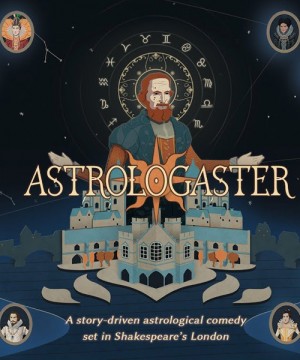iOS
The doctors of Elizabethan England had treatments that seem ridiculous and terrifying by modern standards, incorporating leeches, herbal remedies, and general superstition. In that era, imagine how dubious and outlandish a doctor’s methods would need to be in order to be ostracized and branded a fraud. In Astrologaster, you live on this medical fringe as Simon Forman, looking to the stars (and your own self-interest) to determine how to advise your patients. The idea is fun, but like the bizarre remedies of Forman’s time, Astrologaster doesn’t quite work.
The story attempts to weave strands of history and fiction together via vignettes of Forman’s consultations. You have a variety of regular patients with funny dialogue, including a struggling actor, a nosy neighbor, and a woman whose husbands keep dying. The presentation of these visits is the highlight of Astrologaster, with a neat paper-cut-out aesthetic and amusing songs that herald the arrival of each character. After they explain their medical issue or life crisis, you turn to astrology to diagnose and guide them – but that’s when things start getting hazy.
Click here to watch embedded media
The star-gazing initially seems to have a deductive or puzzle-solving element; one of the first readings has you drawing parallels between the signs in the sky and the name of a vessel in order to recommend a ship to invest in. However, that falls by the wayside quickly, and you rarely need to decipher anything. The celestial elements influencing your choices (like “Uranus represents a change in fortune”) are technically present, but they feel extraneous since each option you’re presented with has a pretty clear interpretation summarized at the top of the screen. All you need to do is read them and decide which one to select, so the astrology becomes more of an aesthetic trapping than a mechanic you actively engage with.
This means the core of Astrologaster is mainly selecting dialogue options, but it falls short in making that impactful. I appreciate how often the choices make you weigh telling the patient the “correct” thing instead of what they want to hear, but the consequences are rarely satisfying either way. If you tell a woman she has evil digestion when she is actually pregnant, the number quantifying your relationship with her takes a hit, but she doesn’t stop coming to see you. If you give an explorer bad coordinates, he still comes back later looking for advice after a mild verbal reprimand. In my second playthrough, I resolved to keep a relationship together that I had sabotaged my first time around, only to discover that it falls apart no matter what Forman says. While rare encounters can have more significant outcomes, most of your selections just change a few lines of dialogue, which conveys the sense that you have no influence on the events.
Click image thumbnails to view larger version
Some of these situations are set in stone because of developer Nyamyam’s desire to achieve a degree of historical accuracy. Outside of Forman’s interactions with real people, the studio says that even the star positions are correct for the dates of his consultations. While that kind of faithfulness requires a lot of ambition and research, it doesn’t necessarily translate to fun. The details surrounding an event may be technically correct, but that isn’t much comfort when your choices as a player feel insignificant.
Astrologaster has a unique premise, clever presentation, and funny writing. Those elements all work in its favor, but the longer it goes on, the duller it gets. The story fails to make most characters interesting, and the illusion of choice (but without meaningful consequences) creates a sense of futility. It is worth checking out if you want to learn more about Elizabethan history and medicine, but those looking to increase their dosage of compelling narrative experiences should seek treatment elsewhere.

Score: 6
Summary: Astrologaster is worth checking out if you want to learn more about Elizabethan history and medicine, but it doesn’t provide a compelling story.
Concept: Assume the role of a “doctor” who employs astrology and questionable remedies to treat his patients
Graphics: Visuals have a cool pop-up-book flair, which compensates for the sparse details and animation
Sound: Voice performances are well done, but skipping text often results in characters talking over each other
Playability: A simple interface makes it easy to select your responses and advance the story
Entertainment: Despite a fun concept at its core, the characters and story don’t pull players in as events unfold
Replay: Moderately Low









